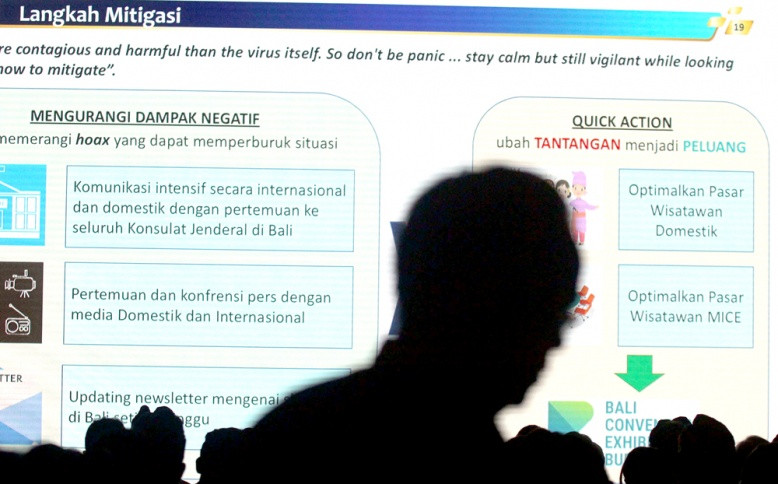Popular Reads
Top Results
Can't find what you're looking for?
View all search resultsPopular Reads
Top Results
Can't find what you're looking for?
View all search resultsHerd instinct rules market
Economic stability is important, but at a time of a possible global pandemic, public health should be top the priority as it can affect the strong economic fundamentals built over decades.
Change text size
Gift Premium Articles
to Anyone
 Contagious: The Bali representative office of Bank Indonesia uses a screen to explain measures the government has been taking to address the COVID-19 outbreak and its impacts on industry during the launch of the Bali Convention Exhibition Bureau on Feb. 13. The outbreak has battered China’s economy, resulting in a nearly 0.2 percent drop in economic growth in Indonesia. (JP/Zul Trio Anggono)
Contagious: The Bali representative office of Bank Indonesia uses a screen to explain measures the government has been taking to address the COVID-19 outbreak and its impacts on industry during the launch of the Bali Convention Exhibition Bureau on Feb. 13. The outbreak has battered China’s economy, resulting in a nearly 0.2 percent drop in economic growth in Indonesia. (JP/Zul Trio Anggono)
U
S$5 trillion was wiped off world markets last week as coronavirus panic spread around the world in the worst week for global shares since the 2008 global financial crisis. On Monday, the market crash did not show signs of abating after Indonesia announced the first two confirmed cases of COVID-19 in the country.
On Tuesday, however, the market appeared to rebound as it gained 2.94 percent after Bank Indonesia (BI) and the Indonesia Stock Exchange (IDX) announced policies to support the stock, bond and foreign exchange markets, which were under heavy selling pressure.
Last week, foreign investors sold off a net Rp 33.6 trillion ($23.5 billion) in stocks and bonds. Over the week, the JCI fell 7.3 percent to 5,452 and the rupiah depreciated by 4.1 percent to 14,234 per US dollar. Ten-year Indonesian government bond yields, which indicate investment risk, rose 35 basis points last week to 6.83 percent, the third biggest increase after Turkey and Russia.
These movements have been inconsistent with the fundamental factors driving Indonesia’s economy. Economic growth, although at the lowest level in four years at 5.02 percent in 2019, is both higher than the global average and those of regional neighbors and Group of 20 peers. Consumer prices are also in check. An inflation rate of 2.72 percent, the lowest in about two decades, is set to drive household consumption, an area that accounts for nearly 60 percent of Indonesia’s gross domestic product (GDP).
The unemployment rate steadying at about 5 percent shows that the workforce remains productive and institutions are expanding and recruiting. Manufacturing activity, as indicated by the IHS Market Indonesia Manufacturing PMI, rose to 51.9 in February, the first increase since June of last year. However, market movements are showing signs of irrationality. Investors are worried that the rapidly growing numbers of cases and deaths outside of China could further drag down global GDP, which has already been restrained by the China-United States trade war.
Indonesian policymakers have pledged support to counter the negative effects of the coronavirus on Indonesian purchasing power and on the country’s tourism sector. The central bank cut the benchmark interest rate by 25 basis points (bps) in February to 4.75 percent after having slashed it by 100 bps in 2019. The government has also announced a Rp 10 trillion stimulus package that includes staple needs and housing subsidies, as well as a six-month tax break for hotels, restaurants and airlines serving 10 priority tourism destinations.
But the government must boost its public health contingency measures to avoid cases going undetected, which would undermine its credibility in managing the health crisis and further spook investors.
As the panicked market demonstrated last week, billions of dollars can be wiped out within days and the potential for further losses still lingers. This means the government must rise to the occasion and do all the prevention necessary, from airport and seaport screenings to improving its testing capabilities and transparency. Economic stability is important, but at a time of a possible global pandemic, public health should be top the priority as it can affect the strong economic fundamentals built over decades.









